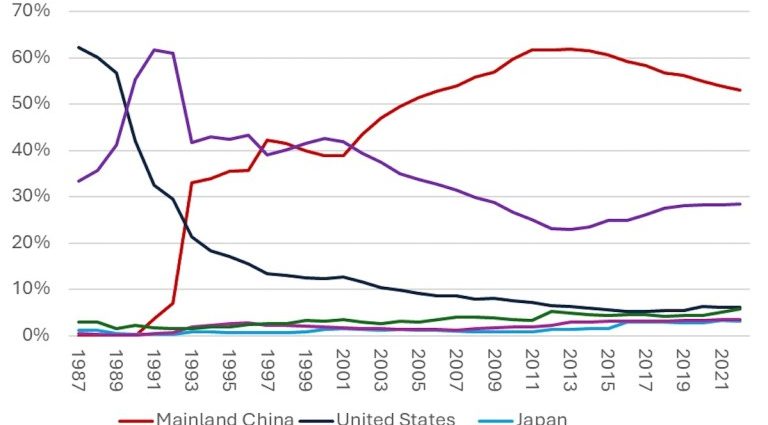Mainland commentators expressed cautious satisfaction with Taiwan’s national election outcome – which returned the Democratic Progressive’s Party (DPP) to office but with a sharply reduced mandate and the loss of its majority in the national legislature.
Taiwan’s voters gave the presidency to the pro-independence DPP, but with a legislative veto in the hands of the pro-unification Kuomintang.
That’s the best possible outcome for Taiwan, whose citizens do not want to be absorbed into the Communist mainland – but don’t want a confrontation over prospective independence, either. For Beijing, stopping Taiwan from moving toward independence is non-negotiable.
The weakened DPP, which has feinted in the direction of independence in the past, is in no position to advance a sovereignty agenda.
The election is a victory for the status quo. Since anything other than the status quo would be worse than the status quo, it’s the best possible outcome. The price of option hedges on the Taiwan dollar/US dollar cross rate (expressed as points of implied volatility) should plummet when markets open in a few hours.
Bloomberg News commented: “The ruling Democratic Progressive Party’s victory in Taiwan’s presidential election Saturday removes key uncertainties for local markets, analysts said, noting China’s muted response and the prospect of major parties having to cooperate on policy.”
Here is the commentary published by the popular Chinese blogger “Uncle Rabbit” in the “Observer,” a prominent news and opinion site based in Shanghai:
In 2020, the DPP had an absolute majority (57.13%) and could be said to represent public opinion; but by 2024, the number of votes received by the DPP dropped by 2.58 million, and its vote share dropped by 17 percentage points; 60% of the people voted against the DPP. Although the DPP got through by chance, it is already a minority administration and can no longer claim to represent Taiwan’s public opinion.
The Taiwan People’s Party suddenly emerged as a force. Representing that third largest party, Ko Wen-je won 3.69 million votes – a breakthrough without precedent in Taiwan’s history. The People’s Party mainly took away votes from the Democratic Progressive Party (Green), attracting many young people in particular. This weakened the ruling foundation of the Democratic Progressive Party.
The Kuomintang vote was also split by the Taiwan People’s Party. KMT got 850,000 fewer votes in 2024 than in 2020, and its vote share dropped by 5 percentage points, but it will be less affected than the DPP. It should be noted that although the “Blue and White” alliance [between Kuomintang and People’s Party] broke down, the fact remains that Blue and White sought to unite to resist the Green [DPP], and this challenged the ruling foundation of the DPP.
This shows that during the past eight years, the Taiwanese people have been dissatisfied with the DPP, and voting against the DPP is the true mainstream public opinion. The DPP’s ruling foundation has been significantly weakened and it can no longer claim to represent the majority of Taiwan’s public opinion.
“Uncle Rabbit” added that the Kuomintang emerged as the largest party in the legislature, which means “that the people are positively disposed toward the Kuomintang’s position and policies, giving it the power to supervise and exercise checks and balances vs the DPP.”
Contrary to many Western comments, the Chinese Communist Party is in no rush to take over Taiwan. As long as Taiwanese sovereignty remains off the agenda, Beijing does not want the headache of forcibly assimilating 25 million Chinese who would rather continue to rule themselves.
In the meantime, China is getting everything it wants from the island. A 2023 study by the Peterson Institute shows that nearly 60% of Taiwanese outbound investment is directed towards the mainland.

Estimates of the number of Taiwanese working on the Chinese mainland range as high as two million.

